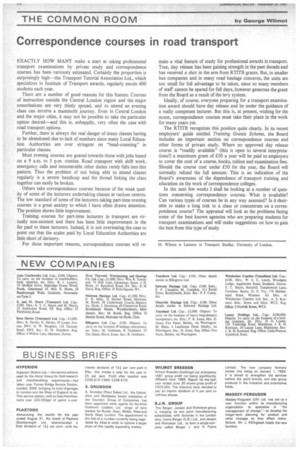Correspondence courses in road transport
Page 66

If you've noticed an error in this article please click here to report it so we can fix it.
EXACTLY HOW MANY make a start at taking professional transport examinations by private study and correspondence courses has been variously estimated. Certainly the proportion is surprisingly high—the Transport Tutorial Association Ltd., which specializes in Institute of Transport awards, regularly enrols 400 students each year.
There are a number of good reasons for this feature. Courses of instruction outside the Central London region and the major conurbations are very thinly spread, and to attend an evening class can involve a mammoth journey. Even in Central London and the major cities, it may not be possible to take the particular option desired—and this is, unhappily, very often the case with road transport options.
Further, there is always the real danger of many classes having to be abandoned due to lack of numbers since many Local Education Authorities are over stringent on "head-counting" in particular classes.
Most evening courses are geared towards those with jobs based on a 9 a.m. to 5 p.m. routine. Road transport with shift work, emergency calls and innumerable other duties rarely falls into this pattern. Thus the problem of not being able to attend classes regularly is a severe handicap and the thread linking the class together can easily be broken.
Others take correspondence courses because of the weak quality of some of the lecturers undertaking classes at various centres. The low standard of some of the lecturers taking part-time evening courses is a great anxiety to which I have often drawn attention. The position shows little improvement.
Training, courses for part-time lecturers in transport are virtually non-existent and there has been little improvement in the fee paid to these lecturers. Indeed, it is not overstating the case to point out that the scales paid by Local Education Authorities are little short of derisory.
For these important reasons, correspondence courses will re
main a vital feature of study for professional awards in transport. True, day release has been gaining strength in the past decade and has received a shot in the arm from RTITB grants. But, in smaller bus companies and in many road haulage concerns, the units are too small for full advantage to be taken, since so many members of staff cannot be spared for full days, however generous the grant from the Board as a result of the levy system.
Ideally, of course, everyone preparing for a transport examination award should have day release and be under the guidance of a really competent lecturer. But this is, at present, wishing for the moon, correspondence courses must take their place in the work for many years yet.
The RTITB recognizes this position quite clearly. In its recent employers' guide entitled Training Grants Scheme, the Board includes an important section on correspondence courses and other forms of private study. Where no approved day release course is "readily available" (this is open to several interpretations!) a maximum grant of £50 a year will be paid to employers to cover the cost of a course, books, tuition and examination fees. Should the course cost under £50 for the year, the Board will normally refund the full amount. This is an indication of the Board's awareness of the dependence of transport training and education on the work of correspondence colleges.
In the next few weeks I shall be looking at a number of questions concerning correspondence courses. What is available? Can various types of courses be in any way assessed? Is it desirable to make a long trek to a class or concentrate on a correspondence course? The appraisal will look at the problems facing some of the best known agencies who are preparing students for transport examinations and will make suggestions on how to gain the best from this type of study.












































































































































